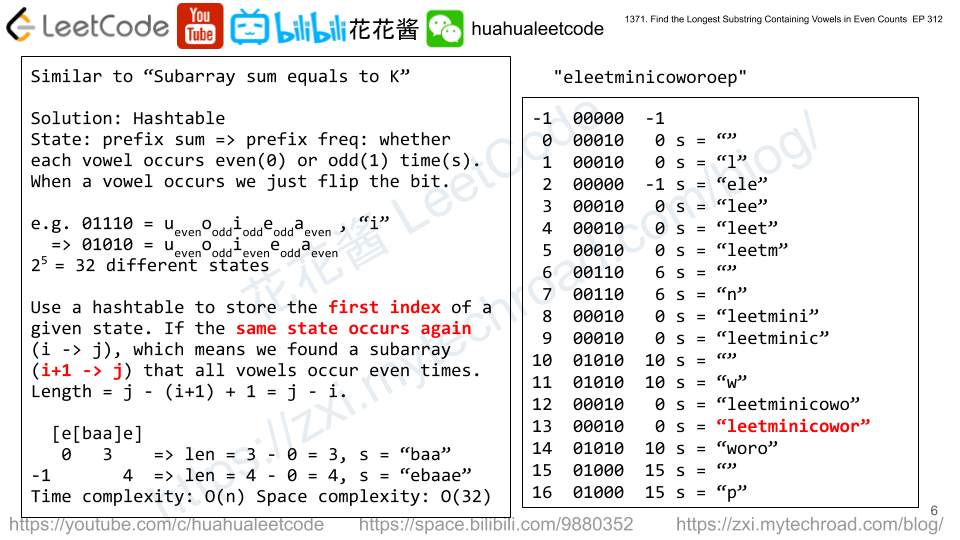Given the string s, return the size of the longest substring containing each vowel an even number of times. That is, ‘a’, ‘e’, ‘i’, ‘o’, and ‘u’ must appear an even number of times.
Example 1:
Input: s = "eleetminicoworoep" Output: 13 Explanation: The longest substring is "leetminicowor" which contains two each of the vowels: e, i and o and zero of the vowels: a and u.
Example 2:
Input: s = "leetcodeisgreat" Output: 5 Explanation: The longest substring is "leetc" which contains two e's.
Example 3:
Input: s = "bcbcbc" Output: 6 Explanation: In this case, the given string "bcbcbc" is the longest because all vowels: a, e, i, o and u appear zero times.
Constraints:
1 <= s.length <= 5 x 10^5scontains only lowercase English letters.
Solution: HashTable

Record the first index when a state occurs. index – last_index is the length of the all-even-vowel substring.
State: {a: odd|even, e: odd|even, …, u:odd|even}.
There are total 2^5 = 32 states that can be represented as a binary string.
whenever a vowel occurs, we flip the bit, e.g. odd->even, even->odd using XOR.
Time complexity: O(5*n)
Space complexity: O(32)
C++
|
1 2 3 4 5 6 7 8 9 10 11 12 13 14 15 16 17 18 |
// Author: Huahua class Solution { public: int findTheLongestSubstring(string s) { const char vowels[] = "aeiou"; vector<int> idx(1 << 5, INT_MAX); // state -> first_index idx[0] = -1; int state = 0; int ans = 0; for (int i = 0; i < s.length(); ++i) { for (int j = 0; j < 5; ++j) if (s[i] == vowels[j]) state ^= 1 << j; if (idx[state] == INT_MAX) idx[state] = i; ans = max(ans, i - idx[state]); } return ans; } }; |
Python3
|
1 2 3 4 5 6 7 8 9 10 11 12 13 14 |
# Author: Huahua class Solution: def findTheLongestSubstring(self, s: str) -> int: idx = {0 : -1} vowels = "aeiou" state = 0 ans = 0 for i in range(len(s)): j = vowels.find(s[i]) if j >= 0: state ^= 1 << j if state not in idx: idx[state] = i ans = max(ans, i - idx[state]) return ans |